PHP frameworks provide a solid foundation for web development and can help you to build efficient, scalable, and maintainable web applications. The best PHP frameworks for you will depend on the specific requirements of your project.
How to choose the best PHP framework
Choosing the right PHP framework can be a challenge, as there are many options available, each with its own strengths and weaknesses. Here are some essential factors you need to consider when choosing a PHP framework:
- Project requirements: Consider what kind of project you will be building and what kind of functionality you need. This will help you narrow down the list of potential frameworks to those that are most suited to your needs.
- Community support: Look for a framework that has a strong and active community of developers. This will ensure that you have access to a wealth of resources, including documentation, tutorials, and support from other developers.
- Performance: Consider the performance of the framework you are considering. This includes factors such as speed, memory usage, and scalability.
- Ease of use: Look for a framework that is easy to learn, use, and add new features as your project grows.
- Documentation and resources: Make sure the framework you choose has good documentation and a wealth of resources available, such as tutorials and forums. This will help you quickly get up to speed and start using the framework effectively.
- Security: Consider the security features that are built into the framework, and make sure it is regularly updated to address new vulnerabilities.
- Popularity: Choose a framework that is widely used and well-established, as this will help ensure that it is well-supported and has a strong community of developers.
Best PHP Frameworks of 2023
-
Laravel
Laravel is a free, open-source PHP framework that is designed to make it easier to build modern, robust, and maintainable web applications. It has a large and active community known for its elegant syntax and clean architecture.
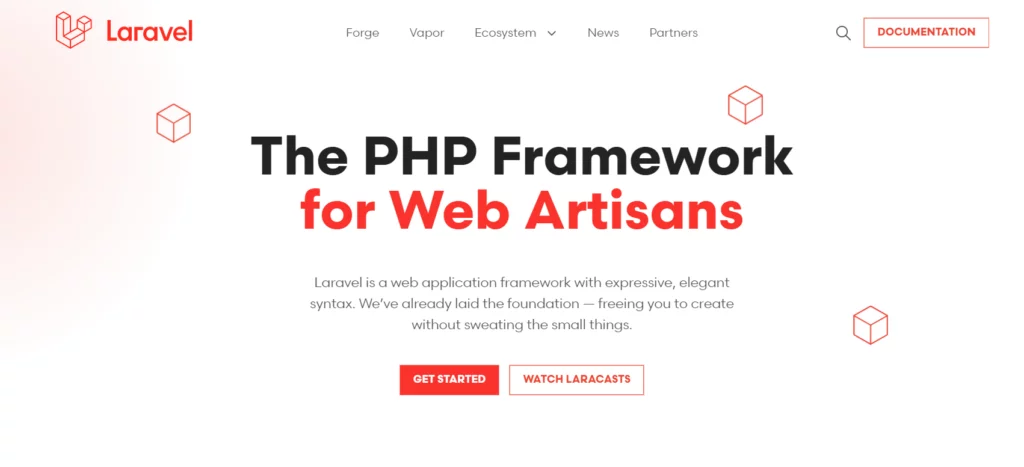
Why Choose Laravel?
- Easy to learn: Laravel has a simple and elegant syntax, which makes it easy to learn, especially for developers with a background in PHP.
- MVC architecture: Laravel uses the Model-View-Controller (MVC) architectural pattern, which helps to separate the presentation logic from the business logic. This makes it easier to manage and maintain the code.
- Eloquent ORM: Laravel provides an Object-Relational Mapping (ORM) system called Eloquent, which makes it easy to interact with databases and perform common database operations.
- Artisan CLI: Laravel comes with a built-in Command Line Interface (CLI) called Artisan, which provides a number of helpful commands for common tasks such as database migrations and task scheduling.
- Blade Templating Engine: Laravel includes a simple and powerful templating engine called Blade, which makes it easy to create dynamic HTML templates.
- Security: Laravel has built-in security features such as password hashing, encryption, and protection against common security threats such as cross-site request forgery (CSRF) and cross-site scripting (XSS).
- Large Community: Laravel has a large and active community of developers, which means that you can find help and support easily and also has a vast repository of packages, plugins, and extensions available to enhance your application.
- Rich Documentation: Laravel has excellent documentation, which makes it easy to get started and learn more about the framework and its features.
-
CodeIgniter
CodeIgniter is a lightweight, fast, and easy-to-learn PHP framework that is widely used for building dynamic websites and web applications. It is known for its simplicity and small footprint, making it a good choice for developers who are just starting out with PHP.
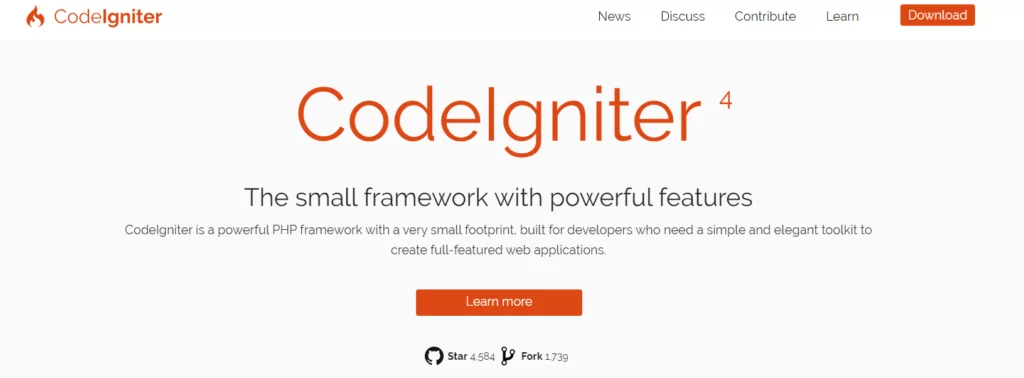
Why Choose CodeIgniter?
- Lightweight and Fast: CodeIgniter has a small footprint and requires minimal system requirements, making it fast and lightweight.
- Simple and Intuitive: CodeIgniter’s simple, straightforward, and intuitive syntax makes it easy for developers to learn and use.
- MVC architecture: CodeIgniter follows the Model-View-Controller (MVC) architectural pattern, which provides a clear separation of logic and presentation layers, making it easier to develop and maintain complex web applications.
- Built-in security features: CodeIgniter includes several built-in security features such as XSS filtering, protection against SQL injection, and encryption of sensitive data, making it more secure than other PHP frameworks.
- Large community support: CodeIgniter has a large and active community of developers, which means that there are ample of resources available to help you, including online forums, tutorials, and forums.
- Large library of pre-built components: CodeIgniter provides a large library of pre-built components and modules, making it easier to develop and deploy your web application quickly.
- Easy to integrate with other tools and systems: CodeIgniter is easy to integrate with other tools and systems, such as databases, payment gateways, and third-party APIs, making it a flexible and versatile framework for web application development
-
Symfony
Symfony is a full-featured PHP framework that is designed to help developers build scalable and robust web applications. It is widely used by large organizations and is known for its modular design, making it easy to extend and customize.
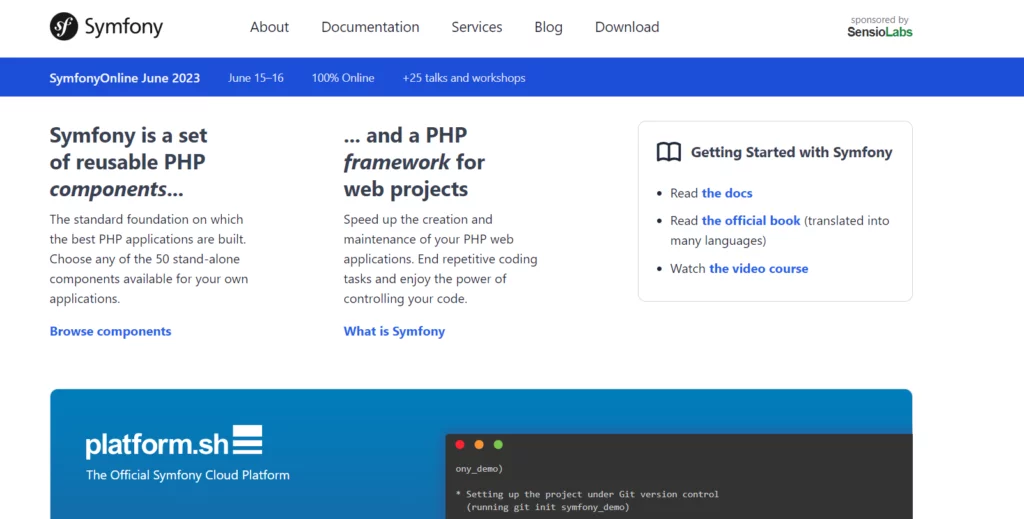
Why Choose Symfony?
- Modularity: Symfony is built on a modular architecture, allowing developers to easily extend its functionality by adding components as needed.
- Flexibility: Symfony can be adapted to fit the specific needs of a project, making it a great choice for complex web applications.
- Community: Symfony has a large and active community of developers, making it easier to find resources and help when needed.
- Documentation: Symfony has extensive documentation, making it easier for developers to get started and learn how to use the framework effectively.
- Security: Symfony is designed with security in mind, providing features such as input validation, output escaping, and password hashing to help protect your application from security threats.
- Performance: Symfony is optimized for performance, providing fast and efficient handling of requests and responses.
- Integration: Symfony integrates easily with other PHP libraries and tools, making it easy to add functionality and extend the capabilities of your application.
-
Yii
Yii is a secure, fast, and efficient PHP framework that is designed for developing modern web applications. It has a wide range of features, including support for multiple databases, caching, and security features. Yii is a good choice for developers who need a high-performance, secure, and scalable PHP framework for developing modern web applications.
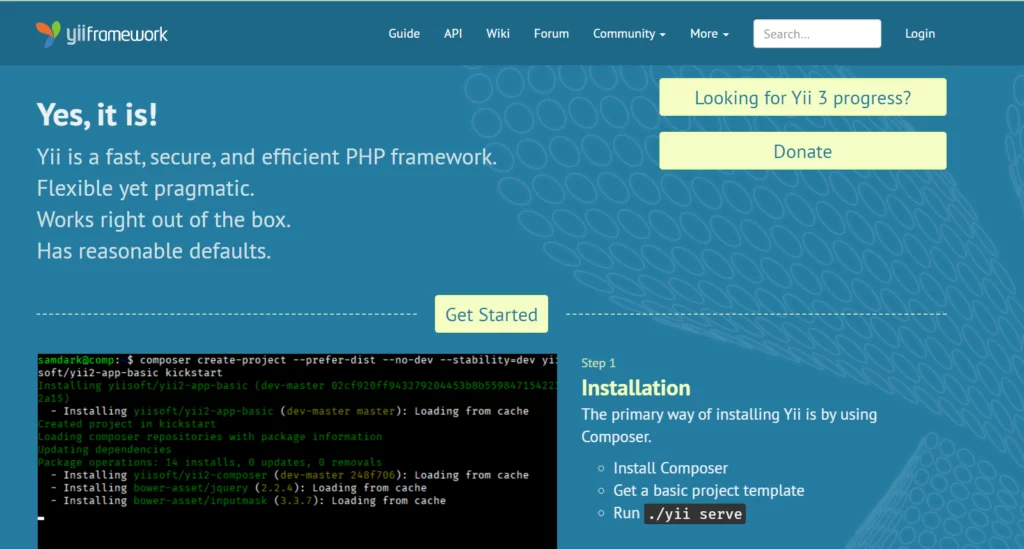
Why Choose Yii?
- Performance: Yii is designed to be fast and efficient, making it a good choice for large-scale, data-driven applications.
- Security: Yii provides built-in security features to help you protect your application against common attacks, such as SQL injection, cross-site scripting (XSS), and cross-site request forgery (CSRF).
- Modular design: Yii is based on a component-based architecture, allowing you to reuse code and build reusable modules that can be easily integrated into new projects.
- Active community: Yii has an active and large community of web developers who contribute to the framework, provide support, and create extensions to extend its functionality.
- Good documentation: Yii has comprehensive documentation, including tutorials, guides, and reference materials, making it easier for new developers to get started and for experienced developers to use the framework effectively.
- MVC architecture: Yii follows the Model-View-Controller (MVC) architectural pattern, which helps to maintain a clear separation of concerns and promotes code reusability and maintainability.
5. CakePHP
CakePHP is a free, open-source, rapid development framework for PHP that makes it easy to build, deploy, and maintain web applications. It is known for its easy-to-use syntax and its convention-over-configuration approach, which reduces the amount of code you need to write. CakePHP is a great choice for web developers looking for a fast, secure, and scalable framework to build their web applications.
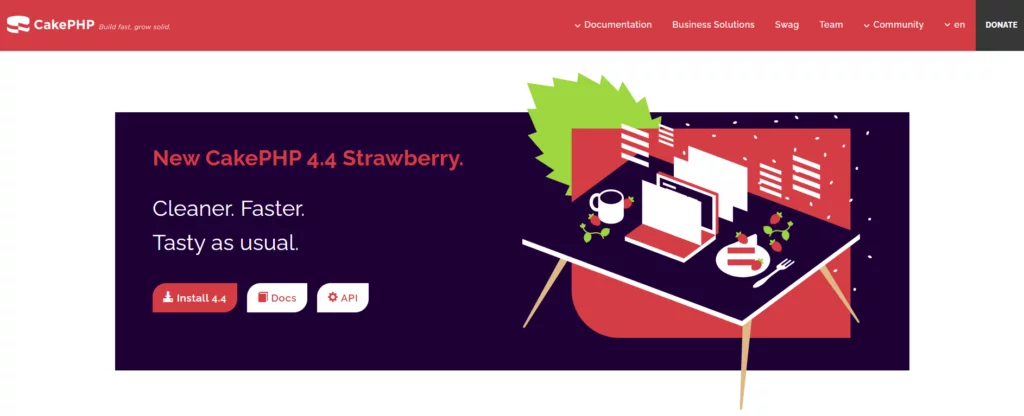
Why Choose CakePHP?
- MVC Architecture: CakePHP follows the Model-View-Controller (MVC) architecture, which promotes the separation of concerns and allows for a clean and organized code structure.
- Built-in Security Features: CakePHP provides several built-in security features such as input validation, XSS protection, and SQL injection prevention, which helps secure your application.
- High Performance: CakePHP has been designed to be fast and efficient. The framework uses caching, lazy loading, and other optimization techniques to ensure your application runs smoothly.
- Large Community: CakePHP has a large and active community of developers, which means that you can easily find answers to your questions, as well as access to a wealth of tutorials and resources.
- Plugins and Components: CakePHP has a large number of plugins and components available, which can be easily integrated into your application to add new functionality.
- Easy to Learn: CakePHP is known for being easy to learn, even for those with limited programming experience. The documentation and tutorials provided by the CakePHP community are comprehensive and well-written.
-
Zend Framework
Zend framework is a flexible and extensible PHP framework that is designed to be used for enterprise-level applications. It comes with a range of features and components that make it easy to build complex, scalable web applications.
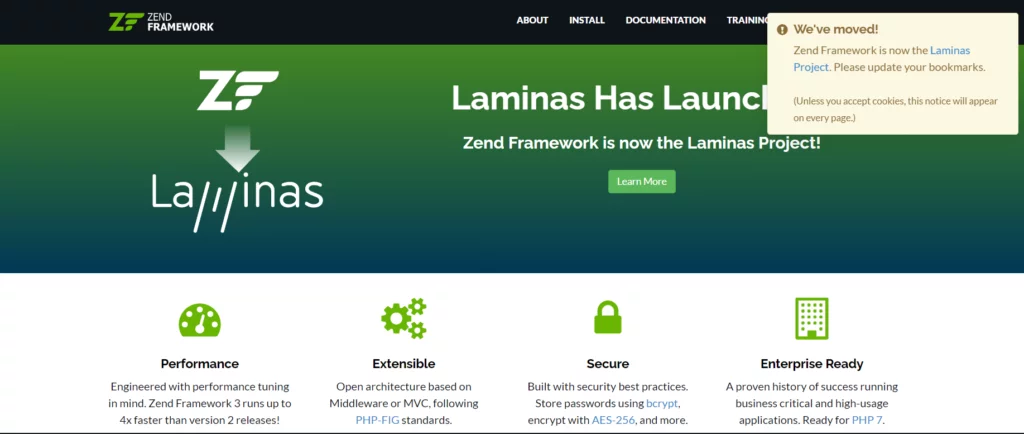
Why Choose Zend Framework?
- Scalability: Zend PHP framework provides a scalable and flexible platform for developing large-scale, complex web applications.
- MVC architecture: Zend uses Model-View-Controller (MVC) architecture, which separates the presentation, data, and control logic into different components, making it easier to maintain and test the code.
- Extensibility: Zend is designed to be highly extensible and customizable, allowing developers to add or modify functionality as needed.
- Security: Zend PHP framework provides several built-in security features, such as input filtering and validation, encryption, and password protection, making it easier to secure web applications.
- Quality codebase: Zend has a robust codebase and is maintained by a large community of developers, ensuring that the framework is of high quality and constantly improving.
- Integration: Zend integrates with other technologies and tools, such as databases, caching systems, and PHP extensions, making it a versatile and flexible platform for web development.
- Professional support: Zend offers professional support and training, making it easier for developers to get help and resources when needed.
-
Phalcon
Phalcon is an open-source PHP framework used for web application development. It was designed to provide high performance and lower resource consumption compared to other PHP frameworks. It is implemented as a C extension, making it faster and more memory-efficient than other PHP frameworks written in pure PHP.
Phalcon is designed as a set of loosely-coupled components that can be used separately or together, making it easy to customize the framework to fit your specific needs. It includes a number of built-in security features, such as input validation, protection against SQL injection and XSS attacks, and encryption functions.
Phalcon is a fast and efficient PHP framework that is well-suited for building high-performance web applications. If you are hunting for a PHP framework that can help you build scalable and secure web applications quickly, Phalcon might be a good choice.
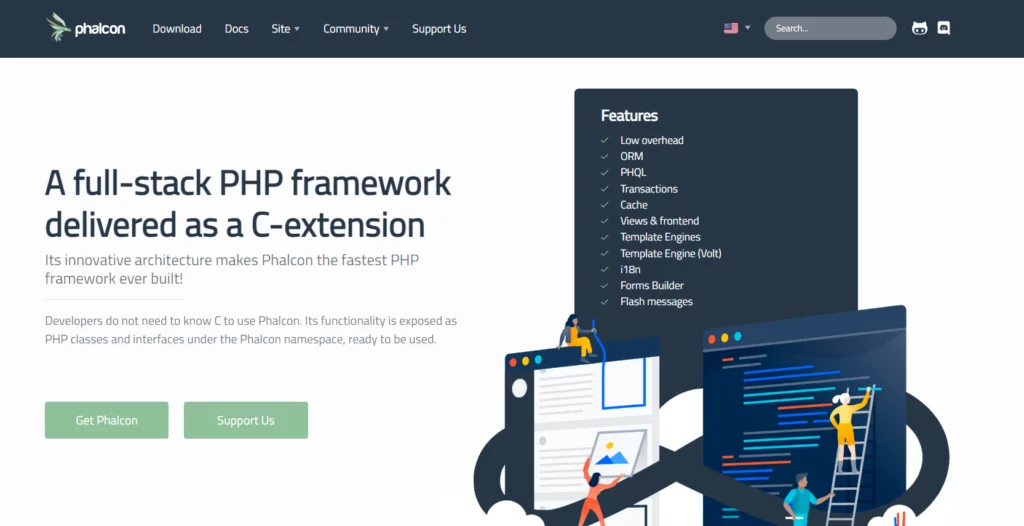
Why Choose Phalcon?
- Performance: Phalcon is designed for performance and is faster than many other PHP frameworks. Because it is implemented as a C extension, it consumes fewer system resources, which results in faster execution times and lower memory usage.
- Security: Phalcon includes a number of built-in security features, such as input validation, protection against SQL injection and XSS attacks, and encryption functions. This helps to reduce the risk of security vulnerabilities in your application.
- Ease of use: Phalcon provides a simple and intuitive API that makes it easy to build web applications. It has a modular design, so you can choose to use only the components you need, and it includes a full-stack framework that provides everything you need to build a web application, including an MVC architecture, routing, caching, ORM, and templating.
- Community and support: Phalcon has a large and active community of developers who can help with questions and provide support. There is also a wealth of information and resources available online, including documentation, tutorials, and forums.
- Cost-effective: Phalcon is open-source and free to use, which makes it a cost-effective solution for web development. This can be especially important for small businesses or individuals who may not have the budget for commercial software.
-
Slim
Slim is a PHP micro-framework that is designed to help you build simple and fast web applications. It provides a minimal set of features and tools, allowing you to focus on writing the code that is specific to your application.
One of the key benefits of Slim is its small size and low overhead, which makes it a good choice for building lightweight applications that need to be fast and efficient. Whether you are building a small application for personal use or a complex system for a business, Slim can help you get started quickly and easily.
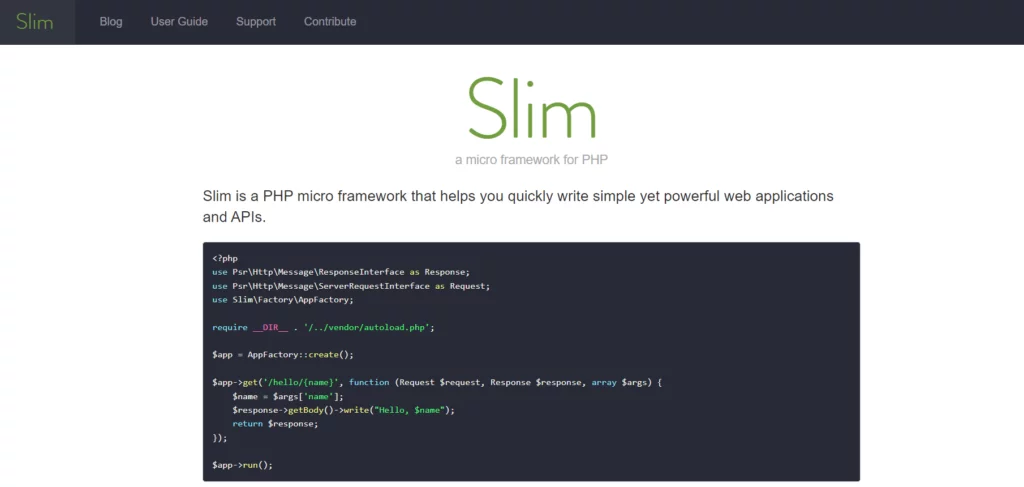
Why Choose Slim?
- Lightweight and fast: Slim is a micro-framework that has a small footprint and is designed to be fast and efficient. This makes it a good choice for building simple and lightweight applications that need to be fast and responsive.
- Easy to use: Slim has a simple and straightforward API that makes it easy to get started and build applications quickly. It has a minimal set of features and tools, which helps to reduce the amount of time and effort required to build an application.
- Flexible and modular: Slim has a flexible and modular design that makes it easy to extend and customize the framework to suit your specific needs. You can use middleware to add custom functionality to your application, or you can write your own custom components and plugins to extend the framework.
- Support for popular template engines: Slim supports popular template engines such as Twig and PHP, which makes it easy to create and render dynamic views for your application.
- Wide community: Slim has a large and active community of developers and users, which provides a wealth of resources and support. You can find tutorials, forums, and other resources online to help you get the most out of the framework.
-
FuelPHP
FuelPHP is a PHP web development framework designed to provide a simple and flexible platform for building robust, scalable, and secure web applications. It is an open-source framework that follows the Model-View-Controller (MVC) architectural pattern, which separates the application’s data, business logic, and presentation layers, making it easier to manage and maintain the code.
FuelPHP provides many advanced features, including URL routing, caching, security features such as input filtering, and support for multiple database systems. It also has a modular structure, allowing developers to easily extend the framework by adding custom modules and packages.
FuelPHP is known for its performance, as it uses a unique URL routing system that enables it to handle large numbers of requests quickly. Additionally, it provides a simple syntax for working with databases and performing common tasks, making it easier for developers to get started with the framework. It is a solid choice for building modern web applications, especially for those who are looking for a flexible and easy-to-use PHP framework.
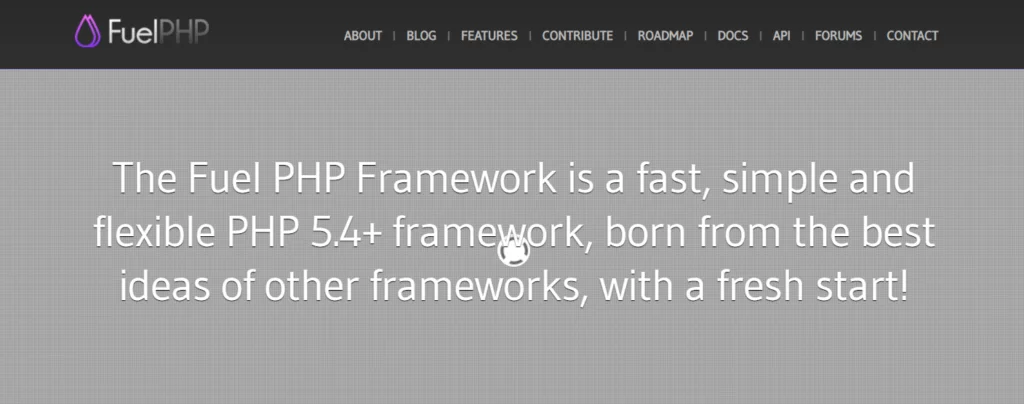
Why Choose FuelPHP?
- Flexibility: FuelPHP provides a flexible framework that can be used to build a wide variety of web applications. It supports multiple database systems and can easily be extended with custom modules and packages.
- Security: FuelPHP includes built-in security features such as input filtering, encryption, and authentication to help protect against common web-based attacks.
- Performance: FuelPHP uses a unique URL routing system that allows it to handle large numbers of requests quickly, making it a good choice for building high-performance web applications.
- Easy to Use: FuelPHP has a simple syntax that simplifies beginning with the framework. It provides a clear and organized structure for building web applications, making it easier to maintain and scale the code.
- Community Support: FuelPHP has an active community of web developers who are constantly contributing working for the framework, providing bug fixes, new features, and documentation.
- Modular Architecture: FuelPHP is built on a modular architecture, allowing developers to easily add custom functionality to the framework by adding modules and packages.
-
Laminas Project
Laminas is a PHP framework that was created as a continuation of the Zend Framework. It is an open-source, object-oriented framework that provides a robust and flexible platform for developing web applications. Laminas is built on top of the PHP language and provides a set of libraries and components for building modern and feature-rich web applications.
The framework offers features such as MVC architecture, modular design, and RESTful web services support. It also provides a range of security features, such as input filtering and encryption, to ensure the protection of sensitive data.
In addition, Laminas has a large and active community of developers who work towards the development and maintenance of the framework, which makes it the best choice for developers who want to build applications with the support of a vibrant community. Laminas is a robust, flexible, and feature-rich PHP framework that is well-suited for developing complex web applications.
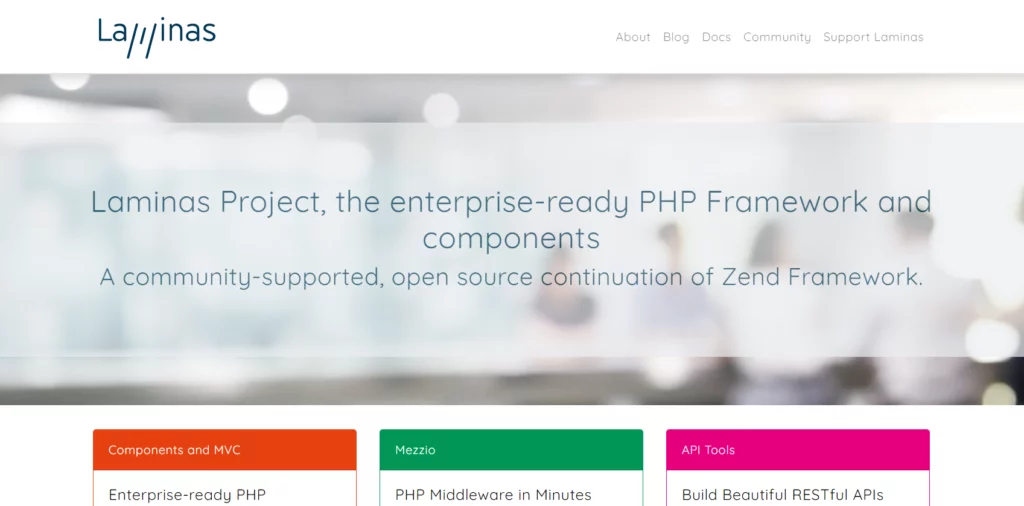
Why Choose Laminas Project?
- Robust and Flexible: Laminas is a highly modular framework, which means that it can be easily extended and customized to meet the needs of a specific project. This makes it a great choice for developing complex and feature-rich web applications.
- Community Support: Laminas has a large and active community of developers who work towards the development and maintenance of the framework. This provides a wealth of resources and support for developers who are using the framework.
- Security Features: Laminas provides a range of security features to help protect sensitive data. This includes input filtering, encryption, and protection against usual security threats such as SQL injection and cross-site scripting (XSS) attacks.
- MVC Architecture: Laminas uses the Model-View-Controller (MVC) pattern, which provides a clear separation of concerns and makes it easier to manage the complexity of a web application.
- RESTful Web Services: Laminas provides support for RESTful web services, making it easy to build applications that consume or provide APIs.
- Large User Base: Laminas has a large user base, which means that it is well-established and well-supported. This provides confidence for developers who are building applications with the framework.
-
Fat-Free Framework (F3)
Fat-Free Framework (F3) is a PHP micro-framework that provides an easy and convenient way to build web applications. It’s designed to be lightweight, fast, and easy to use. This makes it a great choice for small to medium-sized projects. F3 uses a Model-View-Controller (MVC) architecture and supports routing, caching, and template engine out of the box. It supports multiple database systems such as MySQL, SQLite, and PostgreSQL and can be run on Apache, Nginx, and Microsoft IIS web servers.
The framework has a small learning curve and provides a simple and intuitive API for handling common web development tasks. With its clean and well-documented code, developers can quickly understand how to use the framework and build their applications.
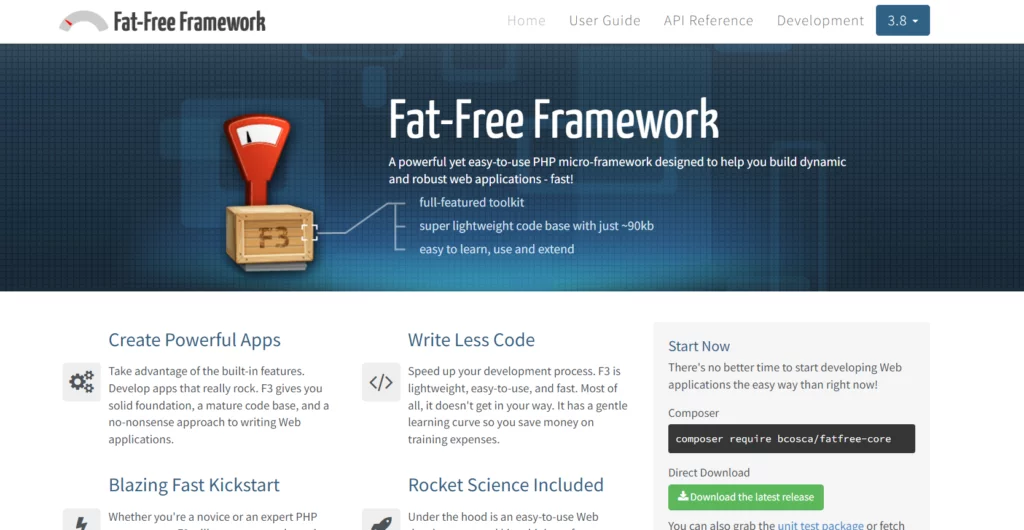
Why Choose Fat-Free Framework (F3)?
- Lightweight and fast: F3 is designed to be lightweight and fast, making it a good choice for small to medium-sized projects. It requires only minimal resources to run and can be used to build applications that respond quickly to user requests.
- Easy to use: F3 provides a simple and intuitive API that makes it easy to perform common web development tasks. This makes it a good choice for developers who are just starting out with PHP development, as well as for more experienced developers who want to build applications quickly and efficiently.
- MVC architecture: F3 uses a Model-View-Controller (MVC) architecture, which helps to separate the logic of your application from the presentation of your data. This makes it simpler to maintain and update your applications, as well as to reuse code and build scalable applications.
- Built-in caching: F3 includes a built-in caching system that can be used in speeding up your applications by storing frequently used data in memory. This makes your applications faster and more responsive and can help reduce the load on your database.
- Community support: F3 has a vibrant community of users who provide support and share their knowledge, making it a great choice for web developers who want to get involved in the development of the framework.
- Flexibility: F3 can be used with a variety of databases and web servers, making it a flexible choice for your web development projects. It supports multiple database systems such as MySQL, SQLite, and PostgreSQL, and can be run on Apache, Nginx, and Microsoft IIS web servers.
-
Lumen
Lumen is a PHP micro-framework created by Taylor Otwell, the creator of the Laravel PHP framework. It is designed to be a more lightweight and faster alternative to Laravel while still maintaining many of the same features and tools.
Lumen is optimized for building microservices and APIs, and it provides a simple, elegant syntax for routing, middleware, and database migrations. It includes many of the same components found in Laravel, including Eloquent ORM, security features like encryption and hashing, and support for many common third-party packages.
One of the key differences between Lumen and Laravel is that Lumen is designed to be more focused and minimalistic, with a smaller footprint and faster performance. This makes it an ideal choice for building smaller-scale applications and microservices, where performance and efficiency are critical. It is a powerful and flexible PHP micro-framework that provides developers with a simple and intuitive toolset for building modern web applications.
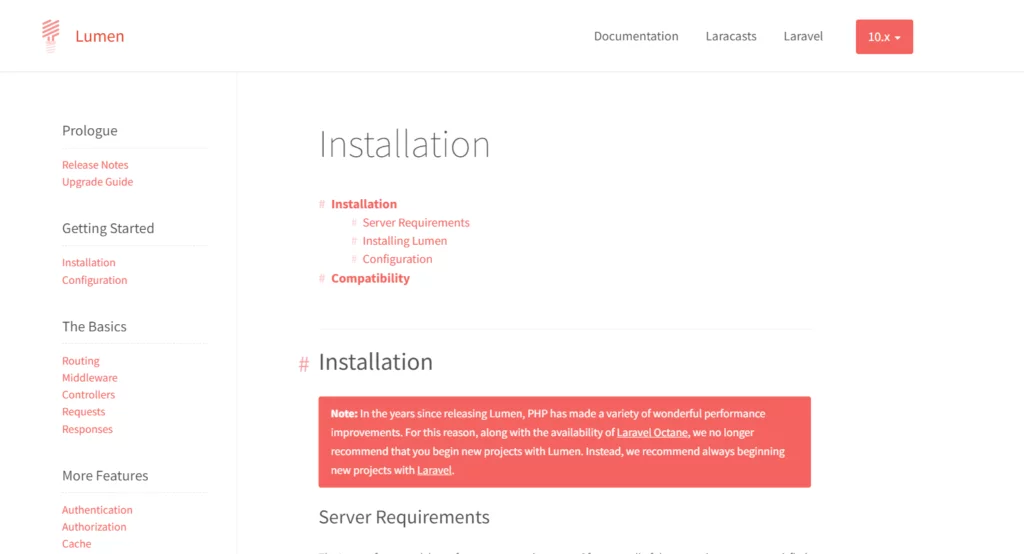
Why Choose Lumen?
- Speed: Lumen is optimized for performance, with a smaller codebase and a more focused feature set. This makes it faster than full-fledged PHP frameworks like Laravel and ideal for building microservices and APIs that need to handle a high volume of requests.
- Lightweight: Lumen is designed to be lightweight and minimalistic, with a smaller footprint and fewer dependencies. This makes it easier to maintain and deploy and eliminates the need for unnecessary features and components.
- Flexibility: Despite its small size, Lumen still provides a robust set of features and tools for building modern web applications. It includes support for Eloquent ORM, middleware, and security features like encryption and hashing.
- Laravel compatibility: Lumen is built on the same codebase as Laravel, so it shares many of the same components and features. This means that developers familiar with Laravel will find it easy to pick up Lumen and start building applications quickly.
- Scalability: Lumen can handle high traffic loads and scale to meet the demands of growing applications. Its lightweight design and performance optimizations make it an ideal choice for building scalable microservices and APIs.
- Community and Support: Lumen is maintained by the same team that develops Laravel, so it benefits from a large and active community of developers and users. This means that you can find support and resources for Lumen easily and be confident that the framework will continue to be developed and improved over time.
-
Flight
Flight is a fast, simple, extensible PHP micro-framework for PHP. It is designed to for easier use and helps you quickly build web applications with minimal overhead.
The framework is built around the principles of being lightweight, fast, and easy to use, making it a popular choice for developers looking to build simple, fast, and scalable web applications. It provides a simple yet powerful routing system that makes it easy to build RESTful web services, and it also supports other features such as handling HTTP requests, rendering templates, and managing dependencies.
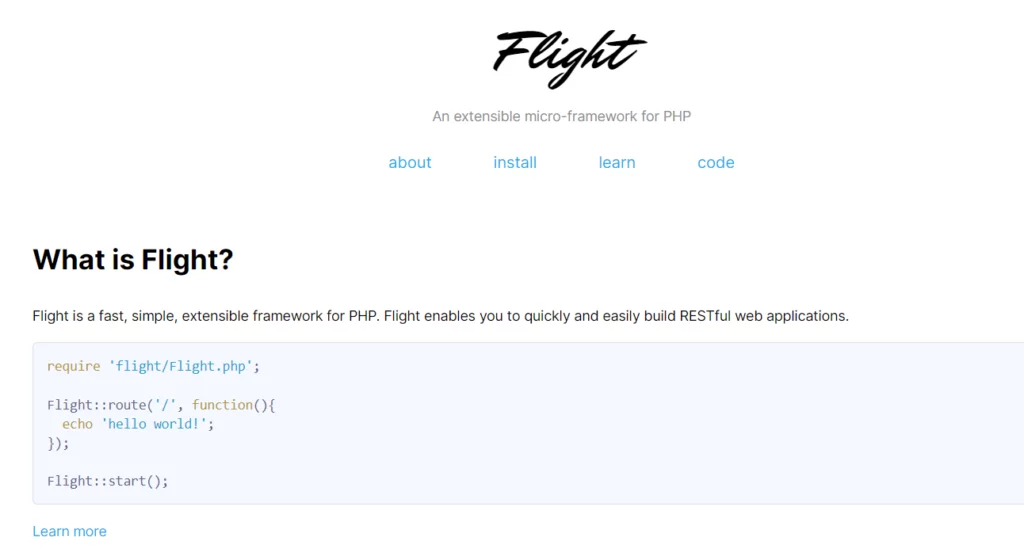
Why Choose Flight?
- Lightweight: Flight is designed to be lightweight and fast, making it a good choice for small to medium-sized projects where speed and efficiency are important.
- Easy to use: The PHP framework is designed to be easy to use and has a simple, straightforward API that makes it easy to get started building web applications quickly.
- Scalable: Flight is designed to be extensible and scalable, making it a good choice for projects that may grow over time. You can easily add new features and functionality to your application as it grows.
- RESTful Web Services: Flight includes built-in support for building RESTful web services, making it a good choice for building APIs.
- HTTP Request handling: Flight provides a simple and flexible way to handle HTTP requests, making it easy to build dynamic, responsive web applications.
- Template Rendering: Flight includes built-in support for rendering templates, making it easy to separate your presentation logic from your application logic.
- Dependency Management: Flight supports dependency management, making it easy to manage and reuse code across your application.
-
PHPixie
PHPixie is an open-source PHP framework for web applications. It is designed to be fast, lightweight, and flexible, making it an ideal choice for developers who are building complex and performance-critical web applications. It is a well-designed and well-documented PHP framework that is well-suited for small to medium-sized web applications.
Why choose PHPixie?
- Performance: Designed to be fast and lightweight, making it an ideal choice for performance-critical web applications.
- Simplicity: Has a simple and intuitive design, making it easy to learn and use, even for developers who are new to PHP.
- Modularity: The modular architecture of PHPixie allows you to only use the components you need, reducing the complexity and overhead of your application.
- Security: Includes several security features, such as input validation, protection against SQL injection, and cross-site scripting (XSS) prevention, helping you to keep your application secure.
- Testing: Provides an easy-to-use testing framework, allowing you to write and run tests for your application to ensure it works as expected.
- Community: Has a growing and active community of developers who are using the framework for their projects, providing support and resources for others.
- Flexibility: Is highly customizable, allowing you to extend or modify the framework as needed to meet the specific needs of your project.
- Drupal
Drupal is a content management system (CMS) and web application framework built in PHP. It provides a platform for building and managing websites and is used by organizations of all sizes, from small personal blogs to large multinational corporations.
Drupal is known for its flexibility and scalability, allowing developers to create custom modules and themes to extend the functionality of the system. It is an attractive option for organizations who want to build a website or web application without incurring the high costs related with proprietary software. It is a powerful and versatile web development platform that is well-suited to a wide range of web development projects. Whether you’re building a simple blog or a complex web application, Drupal has the tools and resources you need to get the job done.
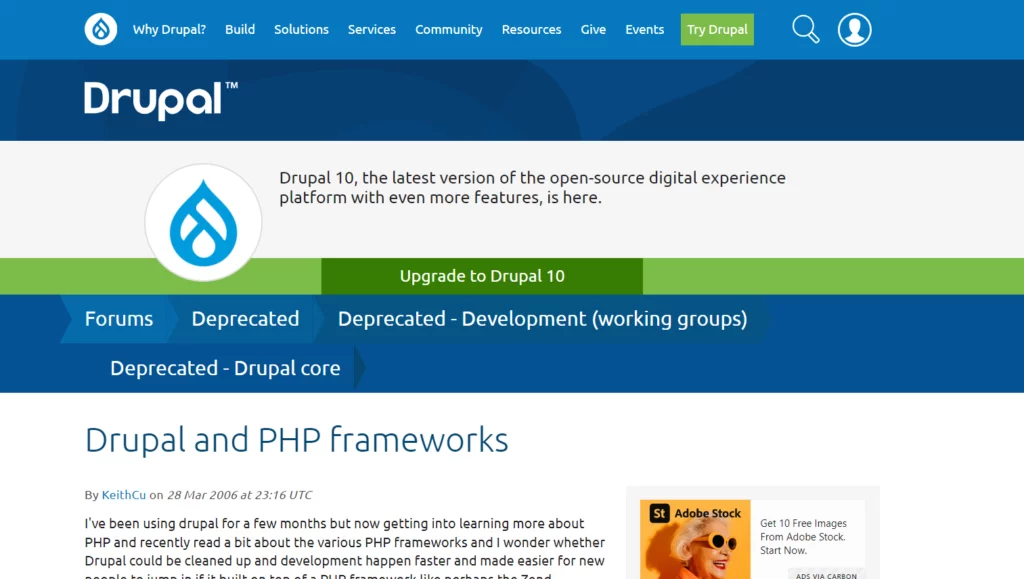
Why Choose Drupal?
- Scalability and Flexibility: Drupal is designed to be scalable and flexible, allowing developers to build complex web applications and websites that can grow and evolve over time. With its modular architecture, Drupal can be extended with custom modules, themes, and extensions, enabling developers to create a wide range of functionality.
- Robust Security: Drupal is well-known for its strong security features and has a proven track record of keeping websites secure. It is regularly updated to address new security threats, and the Drupal community is quick to respond to and address any security vulnerabilities that are discovered.
- Large Community: Drupal has an active and large community of web developers who contribute to the platform and provide support to one another. This means that there is a wealth of knowledge, resources, and support available to those who are using Drupal.
- SEO-friendly: Drupal is designed to be SEO-friendly, making it easier for websites built with Drupal to rank well in search engines. It has built-in support for many SEO best practices, and there are also many third-party modules and plugins that can further improve SEO performance.
- Accessibility: Drupal is designed to be accessible, making it easy for people with disabilities to use websites built with the platform. It follows international accessibility standards and guidelines and has built-in support for accessibility features such as alternative text for images and support for screen readers.
Conclusion
Ultimately, the best PHP framework will mostly depend on the specific needs and the type of application you are building. Consider the size and complexity of your project, your team’s expertise, and your own preferences when choosing a framework. To get started with PHP framework, read the basics of PHP Programming.
FAQs
What are the advantages of using a PHP framework?
The benefits of using a PHP framework include increased productivity, better organization of code, improved security, and faster development time. Frameworks can also help enforce best practices and coding standards, making it easier for multiple developers to work on the same project.
What are some popular PHP frameworks?
Some of the most popular PHP frameworks are CodeIgniter, Laravel, Symfony, Yii, and Zend Framework.
How do I choose the right PHP framework for my project?
The right PHP framework for your project will depend on your specific needs and requirements. Some factors to consider include the size and complexity of your project, your preferred development methodology, the level of support and community resources available, and the performance and security requirements of your application.
Is it necessary to use a PHP framework?
Using a PHP framework is not necessary for all PHP projects, but it can provide many benefits for larger or more complex projects. For smaller or simple projects, it may be more appropriate to use a micro-framework or build your application from scratch.
Can I use multiple PHP frameworks in the same project?
It is technically possible to use multiple PHP frameworks in the same project, but it is generally not recommended as it can lead to increased complexity and maintenance issues. It is usually better to choose one framework and stick with it throughout the development of your project.



